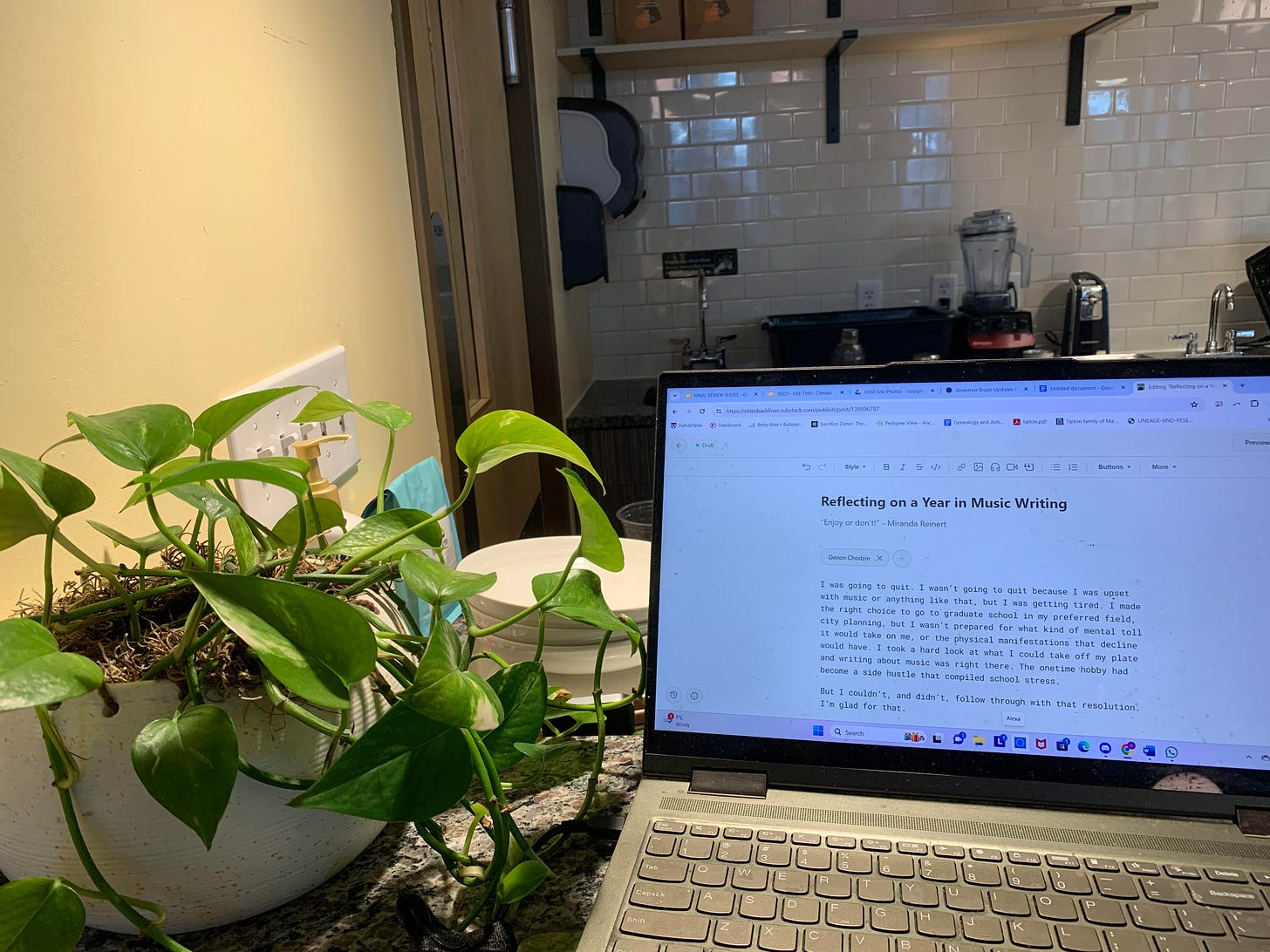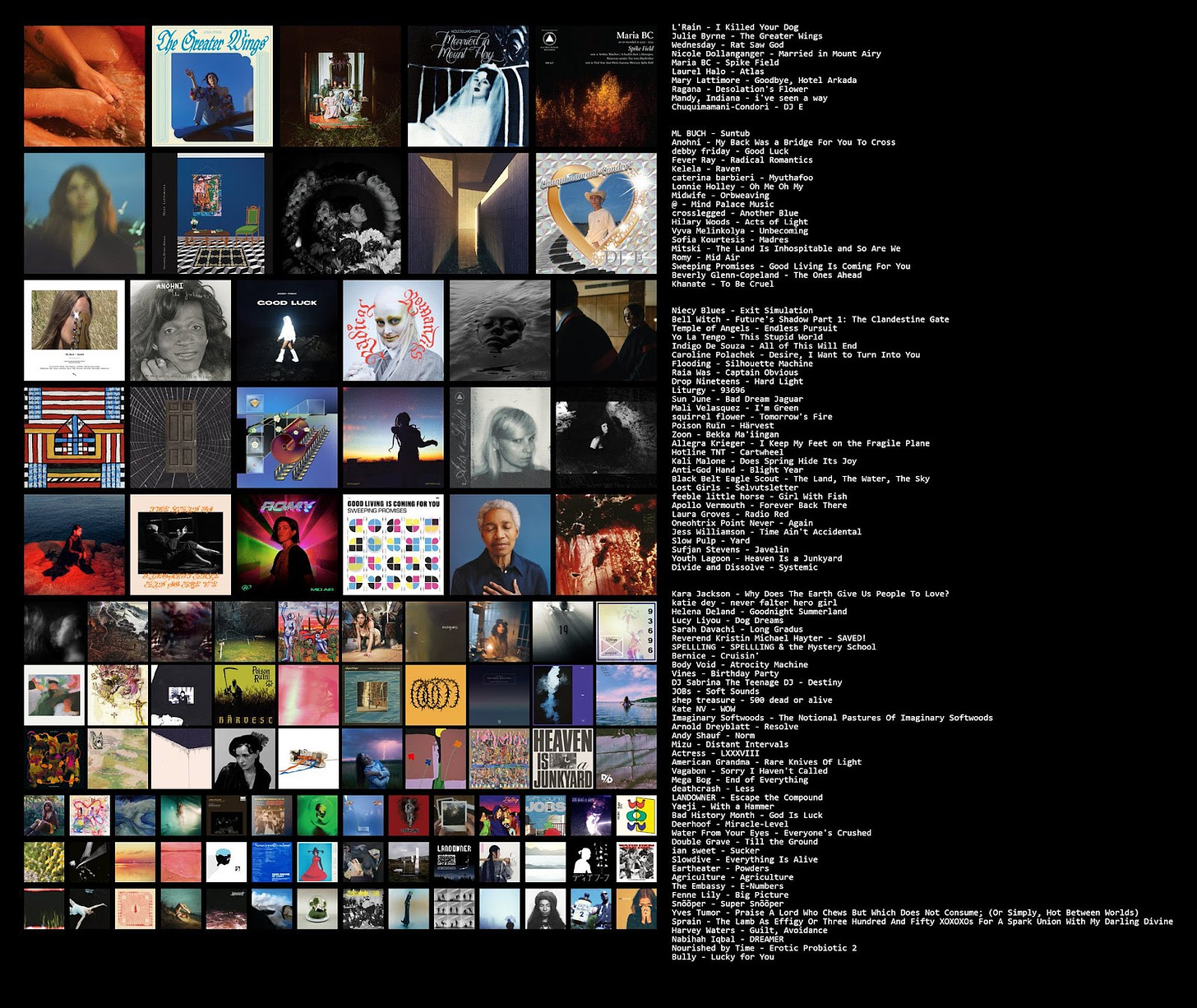My setup as I publish this at Caphe Roasters in northeastern Philly. Our internet is out today.
I was going to quit. I wasn’t going to quit because I was upset with music or anything like that, but I was getting tired. I made the right choice to go to graduate school in my preferred field, city planning, but I wasn’t prepared for what kind of mental toll it would take on me, or the physical manifestations that decline would have. I took a hard look at what I could take off my plate and writing about music was right there. The onetime hobby had become a side hustle that compiled school stress.
But I couldn’t, and didn’t, follow through with that resolution. I’m glad for that.
I rolled back a few things, of course. I wrote considerably less for a few small blogs, ones I still read daily. But, compared to what I wanted to accomplish with other outlets and, eventually, my own little e-newsletter, I felt excited to dive in more closely. What I’ve gotten to do with Paste as a freelancer, for example, has surprised me. As editor Matt Mitchell grew comfortable in their role and we developed more rapport, I could see the possibilities widen. I think what Paste has been able to accomplish in the music vertical is considerable; what role I might have played with my reviews, especially, in elaborating their curatorial vision feels meaningful for the readers and for myself as a writer. Thank you, Matt!
As a music fan, I can feel myself gravitating, again, away from the indie rock backbone I’d built in college and closer to experimental, electronic, and neoclassical experiences. I think, with Paste, I’ve been able to explore that which is familiar and novel to me, exacting my adjudicating eye on indie rock staples like Slow Pulp or Fenne Lily while tackling electronic oddballs like Kate NV or Laurel Halo. Even better, I’ve gotten to wed the two influences through features on progressive output from Mandy, Indiana, and L’Rain, two of my absolute favorites this year. As we come to understand indie rock’s specific influence on media between, like, 2005 and 2015, I think I better understand my place in its influential web. I came of age at the middle and tail end of that period; its influence in 2023 is still substantial but much different. Media is, kind of, adapting.
I also think I have a stronger idea of what organized, for-profit media can actually accomplish, and I have a stronger idea of what that means for people who want to write. It was hard when I felt like I’d found a new avenue through which to share music writing the way I knew how in MTV News and it shuttered, leaving what content I’d prepared for them without a home (luckily, my feeble little horse interview was rehomed at Paste). It was even harder for the folks who’d been working to make the site the success that it was. We still hate the pursuit of growth for growth’s sake. The gradual enshittification of all kinds of platforms, including music media, is giving life a new grossness. On social media, it looks like making the platform experience less enjoyable in for users who are connected to other users and communities they’ve built all in service of profit. On a music media site, that looks like overloading the site’s usability with ads and turning to generative AI for content because what readers remain are attached to the site. It’s infected all corners of music media and permanently destroyed full-time jobs. I’m curious to see how criticism will adapt.
It’s clearer now that holding your own critical platform is essential to facilitating the progress I want to make as a writer. Blogs aren’t there to make it happen for me; you’re kind of supposed to arrive with a beat. It’s incumbent upon me to generate my own platform, but I have to put that second to establishing the urban planning career I still intend to have. So, when my social media is private, or my newsletter doesn’t update for a few weeks (sorry), I know I’m not helping myself in that arena. I know it makes bigger platforms reticent to look at me as a person with an independent voice. I could get frustrated by that, but the more I follow writers who absolutely have their own independent voice, a critical lens, and a level of sophistication in their interaction with music that I want for myself, I understand what’s on me and what isn’t (check out some new favorites).
It’s through that platform that I’ve been able to elaborate some of everyday concerns in music and urbanism (the fundraising machine in schools, nightlife and transit, and more), and especially in the music space, I’ve gone deeper in a couple of the musical curiosities I have and hope to explore more cohesively. Take my interviews with salvia palth for Paste and sign crushes motorist for this newsletter. I’m curious to unpack the history and echoes of the “bedroom pop” scene I was enamored with at the end of high school and early in college; I think they have a greater impact than is fully understood. Celebrities like Alex G and Clairo emerged from those spaces, albeit much differently. The story of “bedroom pop” is a part of the story of streaming, celebrity-making, of “honesty” in music, of peculiarities in stylistic revivals (think Duster’s obscene popularity among the youths). It’s a familiar story with its own quirks; every microgenre has a story like it. Understanding the origins and echoes of a stylistic and cultural impulse is essential for understanding the next one, the next one, and the next one. I think Eli Enis’s exploration of the online “shoegaze” scene is a companion to this phenomenon, one where young people are turning to what technologies and sounds are available to them to channel their emotions because angsty music they can relate to is not being made in the industry at present.
Following writers who have expertise in music that’s unfamiliar to me, especially from locations far from where I live, has been huge over the last few months. I have an excitement for music I haven’t had in a while. Getting to enjoy music from DJ K, Duke, or Ninety One has reinvigorated my appreciation for music discovery. There’s a whole world of music out there, and I don’t have to ignore it just because it’s unfamiliar. It’s essential to my practice as a writer and fan to engage with wholly unfamiliar material and learn how to talk about it meaningfully. There’s a great crop of writers and fans who’ve helped me do that just by posting what’s got them excited. That’s a kind of engagement with music you can’t replicate in the magazines.
I will keep doing this thing, whatever it is, in 2024. I’ll write a bio for you. I’ll review that album. I’ll pitch you. Perhaps I won’t do it daily or even weekly, I never have, but I want to use what skills I have to uplift music that means something. Let’s see how that goes.
And for good measure, here’s a graphic representation of 100 of my favorite albums this year (top 25% or so if what I listened to). I removed several Philadelphia or Cleveland-affiliated albums from friends; they’ll be getting their own newsletter post.





